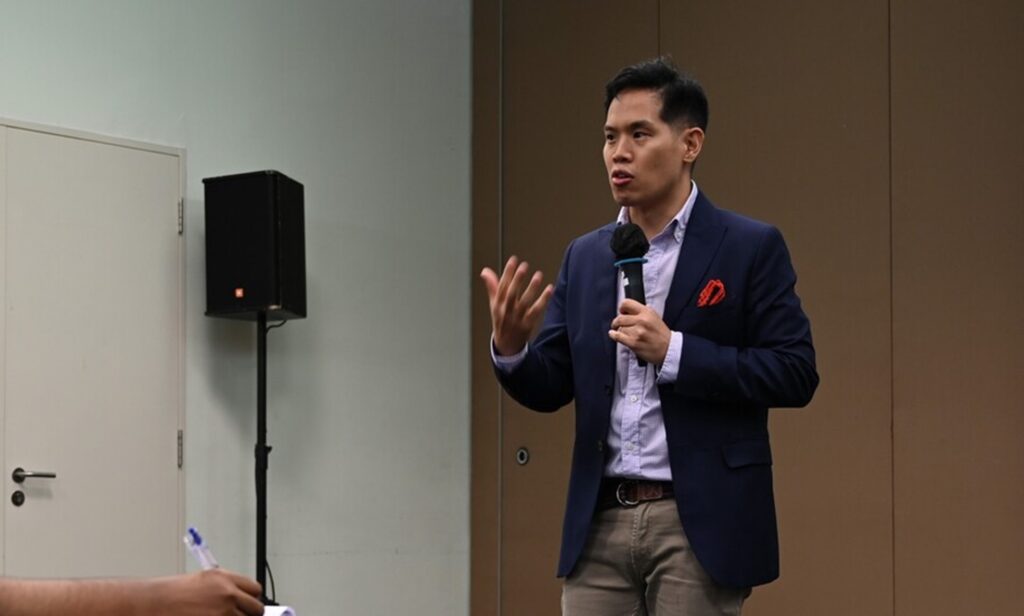Associate Professor Andrew Hui unpacks literary classics for the public
Associate Professor of Humanities (Literature) Andrew Hui shares about the deeper meanings behind classic works of literature at the National Library
 Assoc Prof Hui delivering a lecture. Photo by Loe.
Assoc Prof Hui delivering a lecture. Photo by Loe.
What is the philosophical message behind the empty scriptures in Journey to the West? What can the Chinese classic tell us about books and reading in general? These were some of the questions that were explored in the second lecture of the A Bridge to the Classics series at the National Library.
Held in September and October, the lecture series conducted by Yale-NUS Associate Professor of Humanities (Literature) Andrew Hui is an effort by the National Library Board (NLB) Singapore to acquaint the public with literary classics and their contemporary relevance. The classics discussed over the four lectures are Don Quixote, Journey to the West, Doctor Faustus, and The Tempest.

‘Obsessed with Books in Don Quixote’ lecture held on 14 September 2022. Photo by Tan Rui Min Tavis Hartanto.
Assoc Prof Hui is a specialist in European Renaissance literature with a deep interest in the global classics and other topics such as philosophy. He shares more about the NLB lecture series and his views of the classics in this article.

Assoc Prof Hui addressing questions from the audience after a lecture. Photo by Loe.
What do you think are some stereotypes about the classics?
Assoc Prof Hui: We live in an age of TikTok, Instagram, and Twitter, when people have a very short attention span. Most classics are hundreds of pages of often very difficult, dense text. Who’s got time for that? There is also what people in museum studies call the “threshold fear”: “What do I have to do with Dante? What does Shakespeare have to do with me? I’m not an arts person, I’m a science person. It’s too difficult.” There is also this ‘fixed’ versus ‘growth’ mindset. Again, things like “I’m a science person, I’m a tech person, I’m into finance – literature and philosophy don’t speak to me”.
What I would like to do with the series is for people to see how when we slow down and suspend our desire for instant gratification, the classics have something very important to teach us about life – the art of reading is at the same time an art of living.
What advice would you give to someone who wants to begin reading the classics?
Assoc Prof Hui: You can start by picking up any of the four books that’s on the lecture talks. Once you choose a book you like, you can read that author’s books, or you can read other authors’ writings in the same period, or other authors’ writings on the same subject. Whether it be love, dystopia, or the process of growing up, difficult families, whatever we love or fear or feel in our hearts, there’s probably a work of literature that speaks to that. Whatever difficulties, challenges, sufferings, and joys that we have, we can probably find something in the world of literature that speaks to that.
Speaking of the four classics featured in the talks – why were they chosen?
Assoc Prof Hui: These texts were written in the late 16th to 17th century, which happens to be my area of specialty. I have written and taught about these four texts, so I know them pretty well. I also chose them for the diversity and their representativeness as classics.
These four texts tell us something about human nature too. They also tell us something about classics themselves. They are books about books and how we use or abuse them. They are books about bibliophilia – a love for books – and bibliomania – when we are obsessed with books – and bibliophobia – people who are afraid of books. They show how books can be both a cure and poison.
Which is your favorite classic in the series?
Assoc Prof Hui: I don’t like the experience of reading Don Quixote. It is so long and repetitive. However, I love the story and I love thinking about it. The characters are incredibly fascinating. You fall in love with them. You care about them. I love the questions that Cervantes brings about the relationship between art and reality, and why we chase after our dreams even though it’s impossible. It’s about the meaning of suffering and setbacks – when the entire world is against you, but you still have this purity of spirit and nobility in your vision.
What do you hope the attendees will take away from your talks?
Assoc Prof Hui: I hope the attendees will have a sense of these texts. I hope I can break down their “threshold fear” and the ‘fixed’ mindset. I hope that they will be interested in exploring and thinking more. And I hope that I would have given them some tools within that hour to engage with and interpret these classics.





